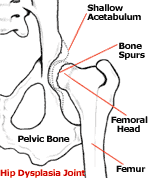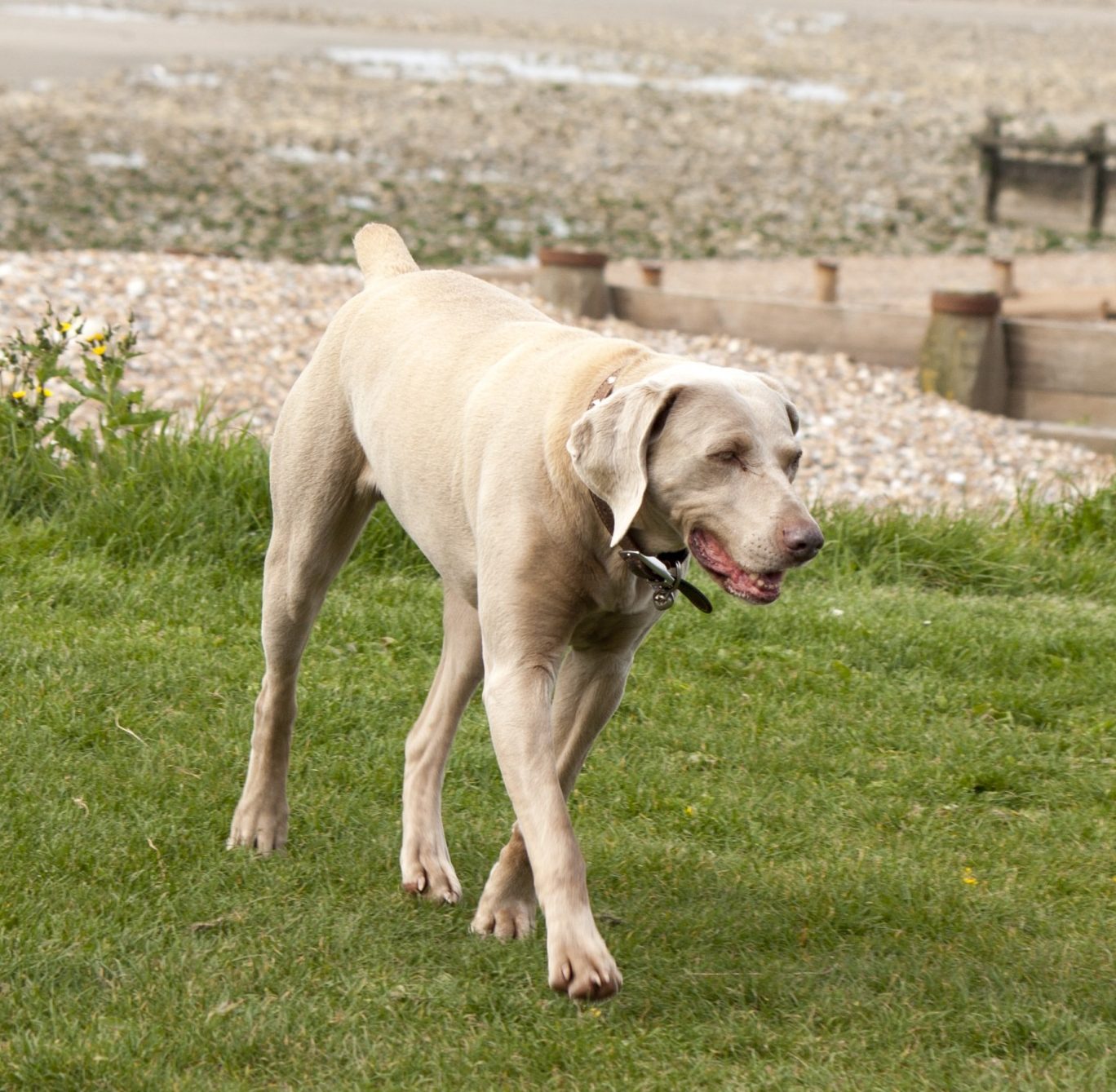Dog hip dysplasia is a genetic disease, common in the Weimaraner. Canine hip dysplasia is most common in large dog breeds, and it is associated with canine arthritis.
In some cases, dog hip dysplasia is preventable, if you know what to do to help your dog.
Without getting too technical here we will discuss canine hip dysplasia symptoms, prevention, and treatment below.
What is Dog Hip Dysplasia?
Hip dysplasia in dogs, also referred to as CHD, is a degenerative joint disease that is caused by both genetic and environmental factors.
In a normal dog hip joint, the femur and pelvic bones fit nicely together, like a puzzle. In a dysplastic hip joint the femur and pelvic bones do not fit together. This results in wear and tear on the bones which turns into arthritis, and it can be very painful.

Symptoms of Dog Hip Dysplasia
Canine Hip Dysplasia symptoms are very similar to those of arthritis. Keep an eye out for the obvious symptoms:
- Limping
- Bunny-hopping (legs moving together when running rather than swinging alternately)
- Difficulty getting up from a lying down position
- Reluctance to stand on rear legs, jump up, or climb stairs
- Loss of muscle tone
- Stiffness, pain, or discomfort after exercise
Dog hip dysplasia can be present in any breed, of any age, and in varying degrees of severity.
However, it is more common in larger breeds and in dogs that are older than 7 years.
Cause of Hip Dysplasia
There are differences of opinion about the cause of dog hip dysplasia. Some researchers believe that it is completely genetic.
However, others disagree and say that the cause is a deficiency of vitamin C and improper nutrition.
Still others claim that OFA develops in puppies that were exercised too hard when they were still little. This is particularly true for large breeds who have been fed high protein puppy kibble to encourage rapid growth.
All purebred dog breeds are at risk, but the large and giant breeds are especially vulnerable.
Unfortunately you can’t detect OFA in puppies, so you wouldn’t know if a puppy would develop it when inspecting puppies in a litter. But, it is believed that a breeding adult can pass the condition on to its puppies.
It is possible that, if both parents have their hips x-rayed by a vet and are declared free of the disease, the puppies would also be disease free.
Treatment of Dog Hip Dysplasia
If you suspect that your dog is showing signs of this disease please talk to your Veterinarian about dog hip dysplasia treatment options. There are many drugs available that could help reduce pain and inflammation. Some are better than others, and they all have side effects.
I prefer to use safe natural products that have a proven track record. One over the counter homeopathic product that works is Nutramax’s Cosequin Supplement It was developed by a vet, especially for dogs with arthritis and hip dysplasia. And dogs enjoy eating the chewable tablets, so it’s easy to get them to take their “medicine”!

Your vet may also suggest doing surgery. Surgery will depend on how old your dog is, how severe his bone degeneration is, and how deep your pockets are.
Weight management plays an important role as well. An overweight dog will have even more stress on its joints which will contribute to more pain/discomfort.
If your dog is overweight try reducing the amount of treats you give her. Make sure you are feeding the recommended amount of food at meal times, and exercise your dog regularly. Walks are ok…you don’t have to be a marathon runner to get your dog to lose weight.
Daily exercise is important to maintain a good range of motion as well as muscle tone. Low-impact exercises such as walking or swimming can be good for your dog. But too much exercise can be harmful. If you’re not sure about how much exercise your dog can take, talk to your veterinarian to find an appropriate exercise routine for your Weimaraner.
Tips to Help Make Your Dog’s Life Easier
- If your Weimaraner dog has trouble going up and down stairs or getting in and out of the car, consider buying or building a dog ramp to make it easier for him/her.
- Cold weather tends to worsen the pain of arthritis. Keep your pet warm by adjusting the temperature in your home or providing a blanket or sweater.
- Provide an orthopedic bed for your Weim to relax on. A firm/supportive bed should evenly distribute the weight of your dog which will reduce the stress on his/her joints. Many veterinarians recommend a high quality memory foam dog bed for dogs with hip dysplasia.
- You can massage your dog to help relax his/her sore muscles.
Canine Hip Dysplasia
Hip dysplasia in dogs is primarily a genetic disease, so there isn’t much that can be done to prevent it. As with any genetic disease, the best way to reduce occurrence is by selective breeding. If you are purchasing a Weimaraner from a breeder, choose your dog breeder carefully.
Ethical Weimaraner breeders will have OFA or PennHip certifications to prove their dogs do not have congenital hip dysplasia. Be sure to ask the Weimaraner breeder to provide copies of the OFA certificates for the puppy’s parents.
OFFA.org (the Orthopedic Foundation for Animals) is an excellent resource for more information on dog hip dysplasia. They are a non-profit organization founded in 1966 with the purpose of limiting the disease of hip dysplasia in dogs. Their mission is to provide radiographic evaluation, data management, and genetic counseling for canine hip dysplasia.
PennHIP.org (the University of Pennsylvania Hip Improvement Program) is another non-profit whose method of evaluation of dog hip dysplasia is certifiable.






Leave a Reply